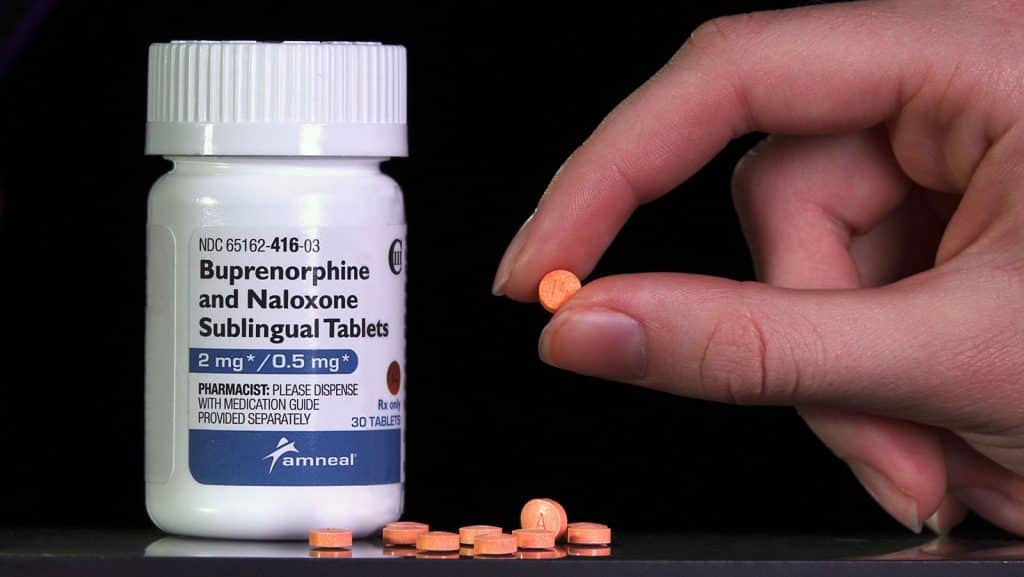If you or a loved one is struggling with opioid addiction, new addiction treatment techniques provide a lot of hope. The latest line of medication-assisted treatments can block opioid cravings and make it far easier to get sober. Suboxone is one of the most popular treatments for substance use disorders. Once you take it, how long do the helpful effects last? Read our guide to find out.

Table of Contents
How Does Suboxone Work?
To understand how long Suboxone lasts, you need to understand the answer to “What is Suboxone? Suboxone is the brand name for a medication that treats opioid use disorder. It combines buprenorphine and naloxone.
These two substances combine to reduce the desire and incentive to take opioids like heroin or prescription painkillers. Buprenorphine is a long-acting, partial opioid agonist. This means that it lightly activates the body’s opioid receptors at a much weaker level than traditional opioids. The buprenorphine helps to block cravings and prevent withdrawal symptoms, yet it doesn’t impair your ability to function or cause a euphoric high.
In addition to reducing the desire to take other drugs, Suboxone also contains substances to prevent Suboxone misuse. The naloxone in the drug blocks all opioid effects if patients inject the drug into their bodies. This immediately halts any helpful impact from buprenorphine and puts you straight into opioid withdrawal. Due to the naloxone, it is almost impossible to misuse Suboxone in a way that would trigger drug-seeking behaviors again.
How Long Does Suboxone Block Opiates?
Since Suboxone affects the body in so many complex ways, it’s impossible to predict exactly how long any given patient will feel the effects. The buprenorphine in the drug usually lasts at least 24 hours. You should not feel any severe opioid cravings or experience any withdrawal symptoms during this time. In some patients, buprenorphine can last even longer. Suboxone may keep them from feeling withdrawn for up to 60 hours.
Meanwhile, the naloxone in Suboxone gets metabolized a little quicker. This substance will usually only directly block opioids for an hour or two. On average, it blocks opioid receptors for 30 to 120 minutes. This means that if you do make the mistake of injecting Suboxone, you cannot feel the effects of another dose for up to two hours.
Why is there no simple answer to “How long does Suboxone last?” There is a lot of variation in how long a dose affects you because every patient metabolizes drugs differently. The length of time you’ll feel Suboxone varies based on your:
- Weight
- Dosage
- Method of ingestion
- Personal health
- Individual metabolism

Understanding the Suboxone Timeline
Once the Suboxone is in your system, it goes through several distinct stages before the effects wear off. The precise timeline varies a little depending on which form of Suboxone you take and how your body reacts to it. Usually, it can take somewhere between 20 minutes to 60 minutes for the drug to start working. Therefore, doctors sometimes suggest people take it a little before feeling intense opioid cravings.
After it spreads through your system, Suboxone will peak around 1.5 hours to 3 hours later. Since Suboxone is only a partial opioid agonist, it won’t cause any intense intoxication. Even when it is at its strongest, you won’t feel much more than mild pleasantness.
Since buprenorphine has such a long half-life, its effects wear off very slowly. Instead of a sharp peak followed by a sudden crash, it will just gradually leave the system. Most people will not feel their Suboxone wear off. The only signs it has reached the end of its lifespan will be if you start to feel cravings, cramps, or other withdrawal symptoms.
Should You Try Suboxone?
If all the effects of Suboxone sound helpful to you, it might be worth talking to your healthcare providers. Suboxone is a prescription medication that only works in certain situations. Before you can take it, your doctor must ensure its effects won’t harm your health. They’ll also spend a lot of time learning about your situation so they can be sure the Suboxone timeline addresses your needs. Some patients may need a shorter-acting or longer-acting drug if the 24-hour effect of Suboxone doesn’t work for them.
Typically, Suboxone is prescribed if you have an opioid use disorder and struggle with cravings and withdrawal. You cannot take it while still using opioids to avoid unpleasant side effects. It only starts working well if you take it at least 12 hours after last using opioids. This medication can occasionally cause reduced breathing and an irregular heartbeat, so it might not be recommended if you have chronic heart or breathing problems. Though rare, some patients try Suboxone and find that they do not like the effects. If it disagrees with your system, you have other options, like trying plain buprenorphine, naltrexone, or methadone.
How Effective Is Suboxone and How Long Should You Take It For?
Suboxone is considered to be one of the most effective medications for opioid use disorders. It prevents withdrawal and cravings, does not have intoxicating effects, and is significantly harder to overuse. Studies have found that Suboxone makes it much easier for patients to avoid using hard drugs.
A 2003 study followed patients for over a year and found that 75% of Suboxone users stayed clean while 100% of unmedicated control subjects relapsed. Another 18-month long study from 2009 discovered that Suboxone patients were more likely to be employed, sober, and participating in 12-step programs. Researchers find that Suboxone use doesn’t completely guarantee sobriety, but it always reduces addiction and death risks while increasing quality of life and overall health.
Just about any amount of Suboxone use can be helpful. However, research shows that longer periods of use are more effective. Those who tried the medication for 12 weeks did better than those who only used it to detox, and those who were on it for year-long periods had even better outcomes. How long should your Suboxone treatment last? Every patient is different, but most benefit from at least six months.

What Dosing Schedule Should You Follow for Opiate Drug Withdrawal?
Suboxone’s effects make it very helpful for managing withdrawal. Opiate drug withdrawal happens when you use opioids for so long that your body becomes accustomed to them. If you stop suddenly, your system can no longer function normally. This usually results in intense withdrawal symptoms like pain, anxiety, insomnia, yawning, diarrhea, and vomiting.
To avoid these issues, you must carefully time your dose to get the full range of Suboxone effects. Your doctor will recommend a dosing schedule that addresses your unique needs. Usually, it starts with an induction stage to gradually build up a safe level of Suboxone in your system. The standard recommendation is to take 2 milligrams every two hours on the first day. Patients then typically switch to a single, higher dosage of around 16 milligrams once daily for a few weeks, taking it more frequently.
Not all people use Suboxone as a long-term drug. Some just use it for a few weeks while they detox and get used to sobriety. However, some people find it more helpful to continue taking Suboxone for months or even years. This is called maintenance therapy, which focuses on allowing you to live a normal life without significant opioid cravings. For long-term users, doses can range from 4 milligrams to 24 milligrams of Suboxone per day. Doctors recommend that patients take the minimum amount needed to manage cravings.

Enjoy a Life Without Drugs
Are you tired of your life revolving around staving off withdrawal? There is hope for those who want to reclaim their life. We provide compassionate, effective substance abuse treatment options at Garden State Treatment Center with our medical professionals. Our substance abuse treatment programs can help you get on the path to sobriety and mental health against opiate addiction or the effects of opioids and suboxone dose (high dosage) and other forms of drug abuse.
We offer a broad range of programs, including intensive outpatient treatment, outpatient treatment, medication-assisted treatment plans, and partial care treatment. Each of our patients gets a tailored blend of therapy and medical care. At your consultation, we’ll learn about your situation and help you determine what medication and other therapy you need. The main goal is to give your body time to heal while we work on the underlying triggers for your addiction.
Ready to get started on your sobriety journey? The right care can help you feel healthy, happy, and centered again. Contact our team today to learn more about our services.
Resources
- https://www.ncbi.nlm.nih.gov/pmc/articles/PMC5855417/
- https://www.drugs.com/medical-answers/long-naloxone-block-opiates-3543375/
- https://www.Suboxone.com/pdfs/prescribing-information.pdf
FAQ
How long does Suboxone last?
What are the side effects of suboxone?
What is the peak of Suboxone?
Published on: 2022-09-12
Updated on: 2024-04-18



